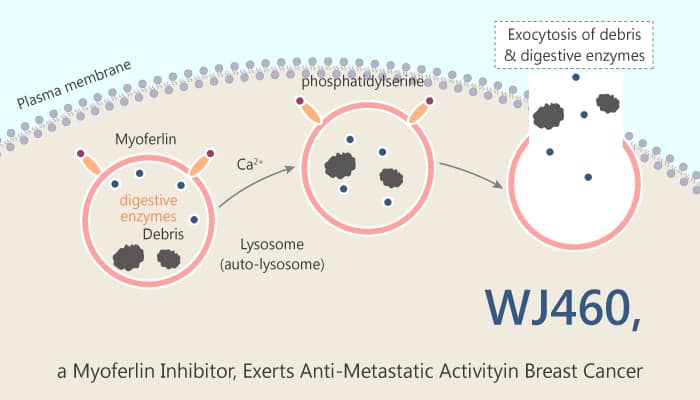Breast cancer represents an aggressive disease with a high prevalence that can develop invasive capability, then rapidly metastasize to other organs. Breast cancer metastasis is a complex process. The initial step in metastasis is that tumor cells achieve invasive capability. Drugs that target invasion may reduce the incidence of metastatic disease. In recent years, several groups of researchers describe the selective overexpression of myoferlin (MYOF) in breast carcinoma specimens. MYOF may act as a key regulator in epidermal growth factor receptor (EGFR) degradation after its activation and internalization in breast cancer cells. Another study shows a critical role of MYOF in TNBC metabolism and a positive correlation between MYOF expression level and TNBC metastasis. Intriguingly, MYOF loss-of-function impairs breast cancer development in vivo. WJ460 is a potent MYOF inhibitor, which interacts directly with MYOF and exerts anti-metastatic activity in the nanomolar range in breast cancer cells.

In vitro, WJ460 blocks breast cancer cell invasion compared with the control condition with IC50 values of 43.37 ± 3.42 nM in MDA-MB-231 and 36.40 ± 4.51 nM in BT549 cells. In addition, WJ460 treatment remarkably inhibits MDA-MB-231 and BT549 cells. Also, WJ460 remarkably inhibits MDA-MB-231 and BT549 cell invasion through Collagen I in a dose-dependent manner.
In vivo, WJ460 results in substantially decreased tumor growth a spontaneous metastasis model. Furthermore, a western blot assay shows that WJ460 diminishes the level of phospho-VEGFR-2 and total VEGFR-2. Furthermore, WJ460 induces no apparent toxicity and no changes in body mass and major organ behavior were observed. Together, WJ460 inhibits breast tumor growth, angiogenesis, and spontaneous metastasis. Besides, WJ460 suppresses breast cancer pulmonary metastasis.
All in all, targeting MYOF by WJ460 may be a promising therapeutic strategy in MYOF-driven cancers.
Reference:
Zhang T, et al. Nat Commun. 2018 Sep 13;9(1):3726.